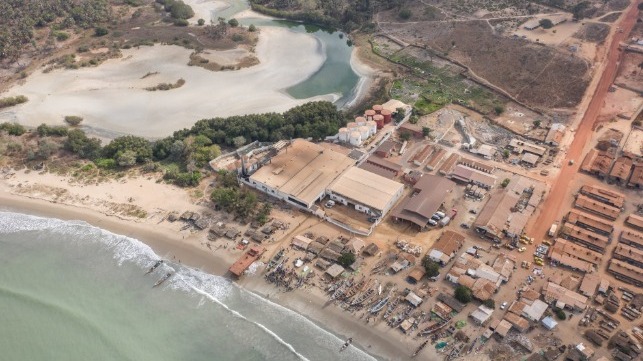Sierra Leone May Have Made Covert Deal for Chinese Fish Meal Factory

Sierra Leone’s government has reportedly struck a $55 million deal with China to build an industrial fishing harbor on 250 acres of beach and protected rainforest, causing an uproar from conservationists and landowners. The development will be located at the Black Johnson Beach off the Atlantic Coast, and it borders Western Area Peninsular National Park – an area recognized for its lush rainforest and biodiversity. Part of the land earmarked for the project is a lagoon in the dry season that opens up into a river during the rainy season. It acts as a fish breeding site, and its water flows into Whale Bay - renowned for whales, dolphins, turtles and many bird species – when it rains.
Two activist groups are petitioning the Sierra Leone government to disclose bilateral agreements for the port project. They believe that Chinese development finance programs want to underwrite a new fish meal factory at the site. However, the government maintains that it is a fish harbor.
Those opposed to the project argue that it will potentially destroy fish stocks along the Black Johnson Beach. This could jeopardize the entire nation’s food security, as 80 percent of the country’s protein supply comes from fish and artisanal fishing practiced by coastal families.
A response released last week by the government’s Ministry of Fisheries and Marine Resources claimed that the government had planned to build a fish harbor at the site since 1970, but had been hindered by financial difficulties. “With the new shift in government policy for the development of the fisheries sector, the Chinese government has given a grant of $55 million to build this platform,” the press statement read. “For technical reasons, Black Johnson was the most suitable place for the construction of the facility in terms of bathymetry, social safeguards (minimum resettlement cost) and environmental issues.”
The activist groups find this statement to be unsatisfactory, as the Sierra Leone government has yet to release the grant agreement with China.
“The press release was very vague. It left us wondering how we arrived here and how we are only hearing about this now. We have a right to know more,” said Basita Michael, a lawyer with the Institute for Legal Research and Advocacy for Justice (ILRAJ).
This development comes as West African nations are seeing a proliferation of foreign-run factories built to satisfy the exploding demand for fish meal exported to the U.S., Europe and Asia. A recent article by Ian Urbina in The New Yorker highlighted the immense ecological and economic costs paid by locals of Gunjur town in Gambia from operations of another Chinese-run fishing processing factory called Golden Lead.
About a quarter of the global fish-catch ends up being used as fish meal to support the growing billion-dollar aquaculture industry as the world pivots from fish capture to culture.
Image credit: Changing Markets Foundation
